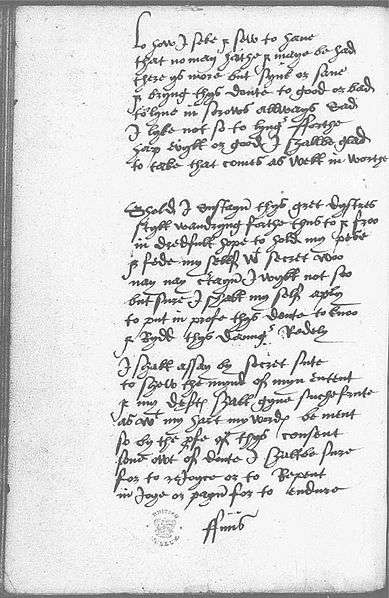|
Introduction | Contributors | Textual Introduction |
| ←Syns loue ys suche that as ye wott | My loue ys lyke vnto theternall fyre→ |
 The Devonshire Manuscript facsimile 52v |
f. [52v]
1 Lo how I seke & sew to haue
2 that no man hathe & maye be had
3 there ys more but synk or saue
4 & bryng thys doute to good or bad
5 to lyue in sorows allways sad
6 I lyke not so to lynger{g'} fforthe
7 hap evyll or good I shallbe glad
8 to take that comes as well in worthe
9 Shold I sustayne{n'} thys gret dystres
10 styll wandryng forthe thus to & froo
11 in dredfull hope to hold my pese
12 & fede my sellf with{w+t+} secret woo
13 nay nay cer{c'}tayn I wyll not soo
14 but sure I shall my self aply
15 to put in profe thys doute to knoo
16 & Rydd thys daunger{g'} Redely
17 I shall assay by secret sute
18 to show the mynd of myn entent
19 {es}{p+} & my deportes1 shall gyue suche frute
20 {es}{w+t+} as with my hart my wordes be ment
21 so by the pro{p2}fe of thys consent
22 send owt of doute I shall be sure
23 for to reIoyce or to Repent
24 in Ioye or payn for to endure
ffinis
Notes & Glosses
1. For the expansion of "por," see Cappelli.[1]
Commentary
Attributed to Sir Thomas Wyatt,[2] this poem was entered by H6 and is unique to the manuscript. The speaker hopes for a quick answer to his doubts about the lady’s regard for him, though it might bring him pain instead of joy.